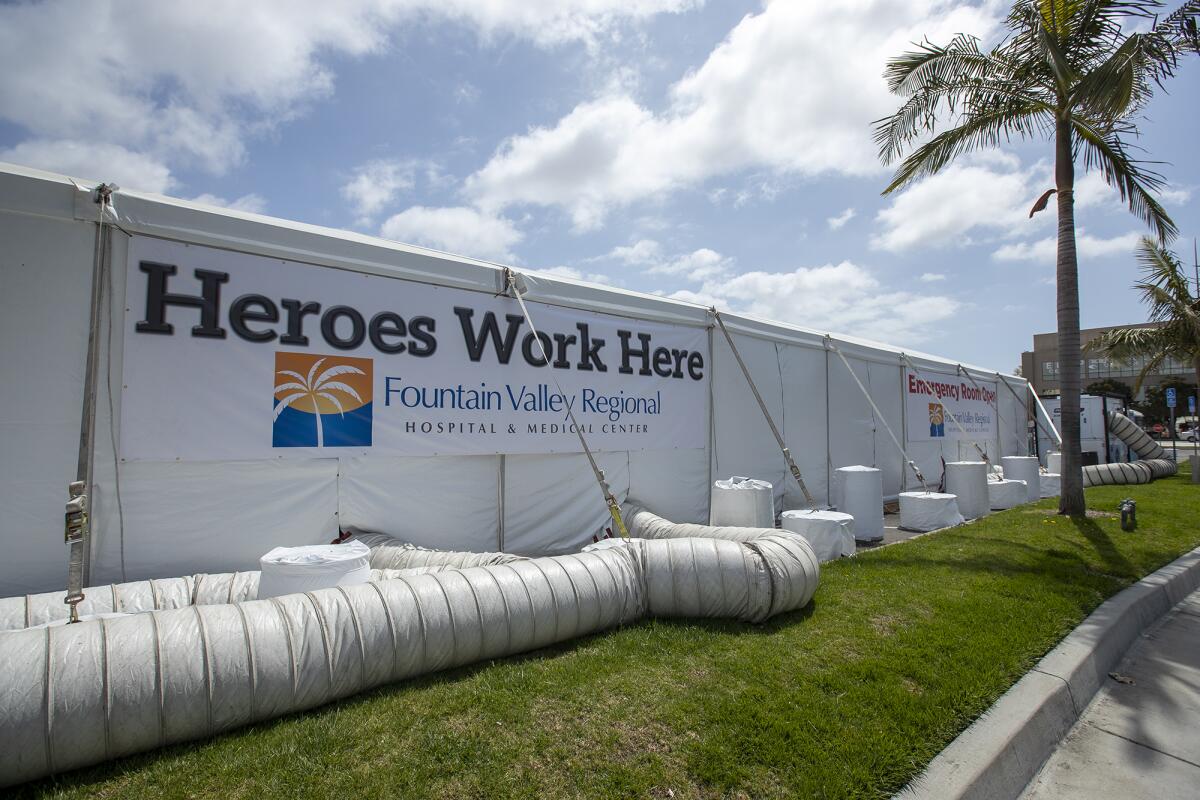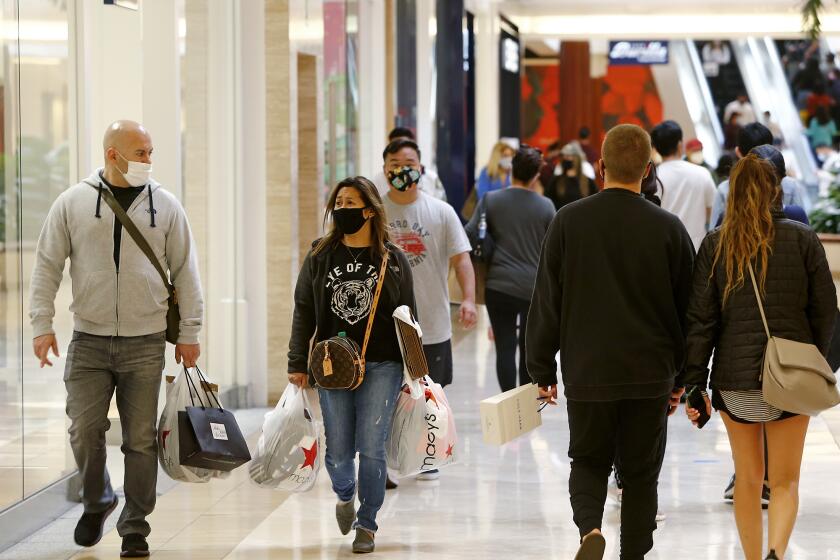Fountain Valley Regional respiratory therapists at epicenter of COVID-19 battle say they are burning out

- Share via
Fountain Valley Regional Hospital & Medical Center respiratory therapists — whose skills and training place them squarely in the epicenter of the coronavirus pandemic — are describing increasingly untenable work conditions as the facility struggles against its capacity to admit and treat COVID-19 patients.
Concerned about urgent safety issues that have so far gone unaddressed as the patient census continues to rise, employees reached out to representatives from the National Union of Healthcare Workers to intervene on their behalf.
“We had a call with therapists over the weekend, who said we need to sound the alarm,” said Barbara Lewis, NUHW’s Southern California hospital division director. “Our members see how bad it is right now. There needs to be a breakthrough because this is not sustainable.”
In a Dec. 20 email to CEO Kenneth McFarland and other hospital officials, Lewis asked for a meeting to discus “a very bad situation regarding patient safety.” When they got no response, they sent a follow-up message and got an immediate reply from Human Resources Officer Mark Fisher.
“There is a lot going on and I am please asking you to be patient,” Fisher wrote, explaining leaders were too busy working in patient care to address the issues. “Please outline your concerns in writing and then I will work with the leaders who can address.”
Several of the 70 or so therapists employed by the hospital, however, say working conditions are far too dire to explain in a list and seek to remedy the situation.
Five employees speaking in an interview Tuesday reported 169 COVID-19 patients were being treated at the Fountain Valley facility, compared to 73 patients during the summertime peak. The recent explosion in the number of ventilated patients, coupled with staff shortages, has been pushing respiratory therapists to their breaking point.
“At this point, we are in a crisis situation. Our licenses are on the line. These patients’ lives are on the line. And they are dying — that’s a fact.”
— Annie Do, Fountain Valley Regional Hospital respiratory therapist
Therapists typically work 12-hour shifts in which they are assigned a series of duties that each have a point value that tends to top out at 30 points, said Fountain Valley employee Michael Kingston. Ventilated patients, for example, may account for six to 10 points, depending on their medical need.
But in the current surge, one employee could be assigned 100 points’ worth of duties in a single day. Meanwhile, it’s not uncommon for a 12-hour shift to stretch by another four, six or eight hours.
“We’ve taken on big workloads that have included triple or quadruple the patients,” Kingston said, adding that the usual ranks of 12 to 15 respiratory therapists working each shift have dwindled to just five or six. “We have people who are on leave or are sick because they’ve been exposed [to coronavirus]. And we’ll be exposed multiple times in 12 hours.”
Annie Do, who’s worked at the hospital for two years, said patients now are sicker than ever before with respiratory symptoms from COVID-19. It’s not uncommon for therapists to have to drop what they’re doing to respond to a “code blue” call, indicating a patient with cardiac or respiratory arrest, several times each shift. A coding patient can pull a therapist from regular floor duties for more than two hours.
The Orange County Health Care Agency reported two deaths due to COVID-19 and an additional 4,406 coronavirus cases in its latest numbers released Wednesday.
“We are running on skeleton crews, and our skeleton crews are already running on empty. We are working extremely hard, without breaks and without lunch, and we are still unable to care for these patients,” said respiratory therapist Annie Do, adding that employees’ pleas for assistance have fallen on deaf ears.
“At this point, we are in a crisis situation,” she continued. “Our licenses are on the line. These patients’ lives are on the line. And they are dying — that’s a fact.”
In addition to an extremely high patient count, employees say a shortage of oxygen is complicating treatment.
Therapist Luis Ramos said that on Sunday oxygen in the East Tower ran out. COVID-19 patients were being housed there before the surge caused patients to overflow into main building units.
“Fountain Valley has the capacity to treat patients presenting at our hospital, and we can safely care for our patients with the supplies that we currently have.”
— Jennifer Bayer, spokeswoman for Tenet Healthcare
Officials with Fountain Valley Regional Hospital and Tenet Healthcare, which operates the facility, did not speak in an interview or respond directly to employee claims. Tenet spokeswoman Jennifer Bayer acknowledged in an email comment the demand to care for COVID-19 patients was “putting a strain on our hospital staff.”
“We take the concerns of our employees seriously and are currently reviewing the issues recently brought to our attention from the union representing our respiratory therapists,” she said. “Fountain Valley has the capacity to treat patients presenting at our hospital, and we can safely care for our patients with the supplies that we currently have.”
Lewis said NUHW representatives will continue to urge hospital leaders to bring in more respiratory therapists to work, either through hiring or incentivizing employees with extra shift bonuses. Fountain Valley Regional recently began offering nurses $2,000 per extra shift plus pay, she said, and in a crisis like COVID-19, respiratory therapists are more crucial than ever.
“There has to be a correction now, because Christmas is coming,” she said, “And respiratory therapists are the people who take care of the patients who are most critical.”
All the latest on Orange County from Orange County.
Get our free TimesOC newsletter.
You may occasionally receive promotional content from the Daily Pilot.





